|
There's STEM & STEAM;
Then there's (The) North Carolina Agricultural and
Technical State University home place of
Innovative STEM & STEAM
offering
A Professional Academic -
Research Education you can take
to the Bank. |
|
|
|
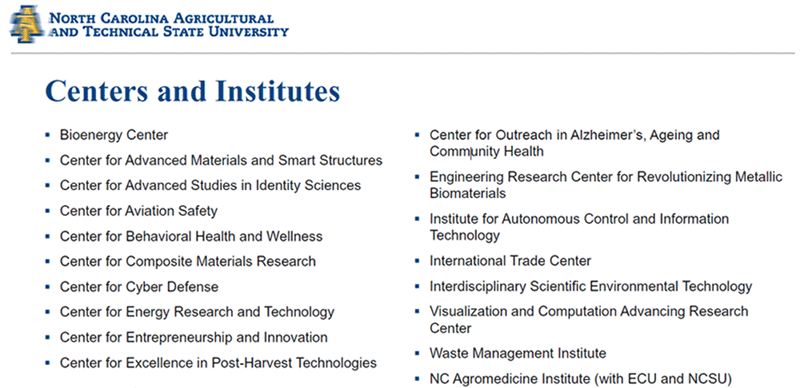 |
| North Carolina Agricultural
And Technical State University is the nation’s largest
historically Black university, delivers educational programs
and technology to enrich the lives, the land and the economy
of North Carolina’s limited-resource individuals, families,
and communities. It is a land-grant, doctoral university,
classified as “high research” by the Carnegie Foundation and
a constituent member of the University of North Carolina
System. A&T is known for its leadership in producing
graduates in engineering, agriculture and other STEM fields.
The university was founded in 1891 and is located in
Greensboro, North Carolina. A&T Media |
| |
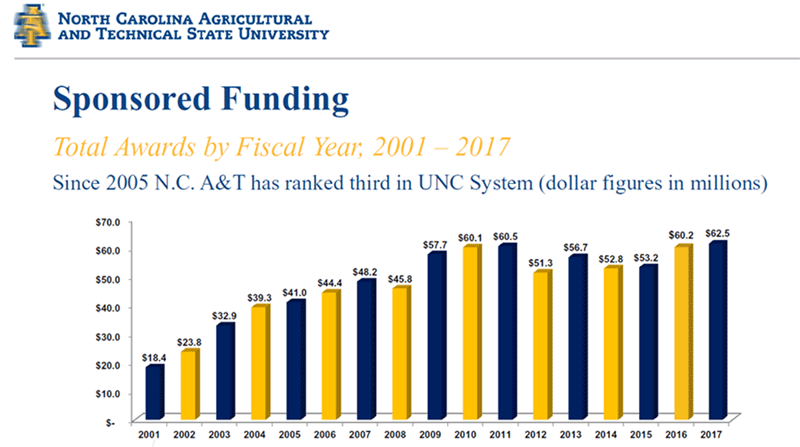 |
N.C.
A&T has Third Consecutive Record Year
for Research Funding
Jamie Crockett
EAST
GREENSBORO, N.C. (July 18, 2019) –
Faculty researchers at North Carolina
Agricultural and Technical State
University earned $64.37 million in
contracts and grants in 2018-19, school
leaders revealed today. A strong
majority of the research awards come
from the federal sector, are competitive
in nature and support collaborative and
innovative projects. |
| |
|
|
|
 NC
A&T is connect to the North Carolina Education and Research
Network (NC-REN) dedicated to high speed traffic and
research data. Ask Harold "HN" Martin why is he connecting
A&T research to UNC Greensboro's Gate City Network?
Overview
of NC A&T Research capabilities. A&T has two Cray Supercomputers(2),
an amazing assortment of high performance computing capabilities,
and connect to Internet2 (NC-REN) a North Carolina Research
Educational network focused on high speed traffic and research data.
Video Report NC
A&T is connect to the North Carolina Education and Research
Network (NC-REN) dedicated to high speed traffic and
research data. Ask Harold "HN" Martin why is he connecting
A&T research to UNC Greensboro's Gate City Network?
Overview
of NC A&T Research capabilities. A&T has two Cray Supercomputers(2),
an amazing assortment of high performance computing capabilities,
and connect to Internet2 (NC-REN) a North Carolina Research
Educational network focused on high speed traffic and research data.
Video Report |
|
|
|
|
|
|
|
UNCG, N.C. A&T Awarded $500K
from NSF To Build High Speed Network
EAST GREENSBORO, N.C. (July 2, 2019)
– UNC Greensboro (UNCG) and North Carolina Agricultural and
Technical State University (N.C. A&T) have been awarded a
two-year National Science Foundation (NSF) grant of |
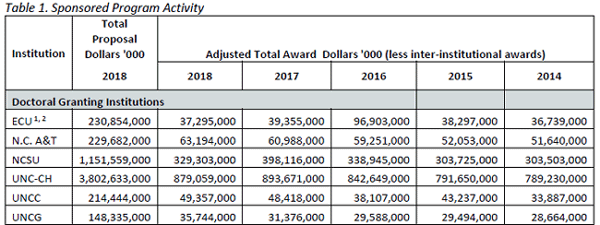 |
UNC Greensboro is dead last in sponsored research
among Doctoral
Granting Institutions in the UNC System in the years 2018 thru 2014. |
| $499,912 to build a high-speed research data
network that will both connect the two largest universities
in the Triad with each other and enable faster, easier
sharing of research with scientists around the world.
The Gate City Research Network (GCRN)
is one of only 11 NSF Campus Cyber
Infrastructure awards in the state
of North Carolina and is the first
award in the state for the category
of Network Infrastructure.
Approximately $358,000 of the award
will be managed directly by UNCG,
while approximately $142,000 will be
managed by NC A&T as a “sub-award.”
Source UNC |
|
| |
The
GCRN will create a
multi-institutional network
supporting research activities
through a clean, low-latency,
high-speed internet connection. This
will give researchers access to
dedicated, high performance
computing resources while helping to
eliminate issues posed by using
existing networks that also carry
administrative, entertainment (i.e.
movie streaming, gaming), and other
non-scientific data. The GCRN will
enable fast transfers of the
enormous amount of data that fuels
innovative research. This will
significantly increase the
fundamental research capacity in
disciplines such as chemistry, nano-engineering,
nano-, computer-, and data science.
“This award represents a significant
step in our shared journey to help
advance the capabilities and
reputation of our universities and
our region as world-class leaders in
research,” said UNCG Chancellor
Franklin D. Gilliam, Jr. “A state of
the art network will help fuel
innovation, spark economic growth in
our region, and enable us to deliver
meaningful scientific breakthroughs.
It will also further deepen the
existing partnership between UNCG
and N.C. A&T, helping to connect our
outstanding scientists with
collaborators around the world.”
|
Added N.C. A&T Chancellor Harold L.
Martin Sr., “This is an exciting
opportunity for researchers at N.C.
A&T, UNCG and their collaborators
from around the globe. My
expectation is that this new data
network will assist our researchers
in strengthening existing
partnerships and creating new
partnerships that will produce
innovative solutions to some of the
world’s persistent challenges.”
UNCG’s Jeff Whitworth, associate
vice chancellor and chief
infrastructure architect, served as
the Principal Investigator (PI) for
this grant, with co-principal
Investigators Shyam Aravamudhan,
associate professor, N.C. A&T; Geoff
Starnes, associate vice chancellor
of information technology and deputy
chief information officer, N.C. A&T;
and Daniel Todd, director, Triad
Mass Spectrometry Facility. |
| |
|
|
| |
|
“The Joint School for Nanoscience and
Nanoengineering...built on the
major nanotechnology research activity that had
been established at nearby Wake Forest and at NC
A&T [1] |
| |
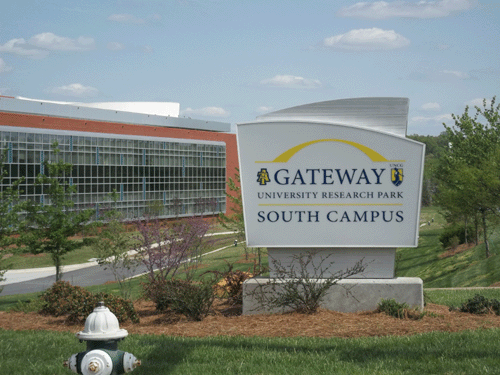 Banality
of Evil -- Conceived
in bigotry and nourished on the twin fronts of
prejudice and injustice, the Joint School of
Nanoscience and Nanoengineering. Banality
of Evil -- Conceived
in bigotry and nourished on the twin fronts of
prejudice and injustice, the Joint School of
Nanoscience and Nanoengineering. |
| |
|
“It [JSNN] will be one of the most stimulating
opportunities in the history of the area and
will serve as a national model for collaboration
between two institutions, one a historical black
institution and the other a historical white
female institution.”;
“Activities/Resources: Leverage faculty
collaboration at JSNN to enhance research
partnerships between UNCG and NCA&T researchers.
Expected Result, UNCG opportunities in grants
previously unavailable due to limitations in
areas of certain research expertise. “ [UNCG UNC
Tomorrow 4.1 & 4.4 Final Report] |
| |
| Ask UNC
Board of Governors, NCA&T Chancellor Harold
Martin, NC A&T Board of Trustees where are NC
A&T Nanoscience MS. and Ph.D. degrees.
"UNCG and NC A&T are partners. UNCG is offering graduate degrees
in nanoscience; A&T will eventually offer degrees in
nanoengineering." |
|
|
|
|
 May
2007 UNC Board of Governors established alleged Joint
School of Nanoscience and Nanoengineering, at bogus NC
A&T / UNCG Joint Millennial campus Gateway University
Research Park, to off (a) joint interdisciplinary Ph.D.
degree and (a) joint professional science master's
degree.
In order
for UNC-G to offer Nanoscience degrees it must access NC
A&T academic circular and research [Although the degree
is in Nanoscience (and does not include
Nanoengineering), May
2007 UNC Board of Governors established alleged Joint
School of Nanoscience and Nanoengineering, at bogus NC
A&T / UNCG Joint Millennial campus Gateway University
Research Park, to off (a) joint interdisciplinary Ph.D.
degree and (a) joint professional science master's
degree.
In order
for UNC-G to offer Nanoscience degrees it must access NC
A&T academic circular and research [Although the degree
is in Nanoscience (and does not include
Nanoengineering),

students will be given the opportunity to take relevant
courses at the School of Engineering at North Carolina
A&T University and will be able to work on collaborative
projects with faculty in the school of Engineering-
request to plan Ph.D. in Nanoscience. |
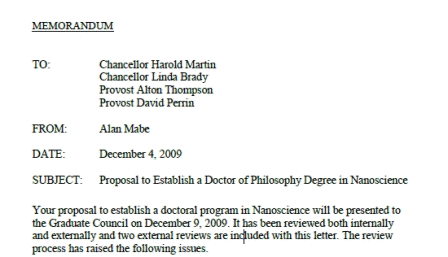 |
|
December 9, 2009 UNC
Graduate Council recommends authorization of the joint
PhD,
Dr. James Sadler Associate Vice President for Academic
Planning University of North Carolina
Chronology. |
|
The University of North
Carolina Board of Governors approved establishment of
the MS in Nanoscience on November 13, 2009, and
establishment of the PhD program in Nanoscience on
January 8, 2010, excluding NC A&T. December 9. |
| |
|
|
"There are 15 or more members on the Board of
Governors from .... and none from North Carolina A&T or
other HBCUs within the system, clearly equality and
respect has not been shown to A&T by the system." NC
A&T Board of Trustee member said, as published in BOT
Meeting Minutes 04-18-07. |
| |
|
|
Examining Nanoscience
discipline file at www.northcarolina.edu : |
 |
 |
|
1. The
discipline file contained no UNCG
Notification to plan a master’s in
Nanoscience,
2. The
discipline file contained an unsigned “Revised
UNCG Request to Establish a Master’s in
Nanoscience,
3. The
discipline file contained no UNCG Request to
plan a PhD in Nanoscience
4. The
discipline file contained no UNCG Request to
Established a PhD in Nanoscience |
|
| |
|
|
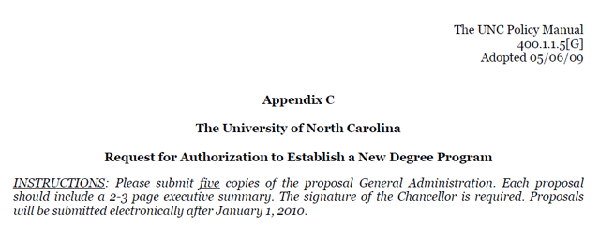 |
|
Chancellor signature certifies proposal [UNC Policy
Manual 400.1.5(G)] to establish new degree program was
reviewed and approved by the appropriate campus
committees and authorities. |
| |
|
Responding to a Public records request to Dr. David H.
Perrin UNCG Provost & Executive Vice Chancellor,1/7/11,
for a copy of an UNCG chancellor signed request to
establish stand alone Masters and PhD Nanoscience
degrees at UNCG, Counsel Steve Serck responded "In
response to your request of 1/7/11, no such documents as
you described exists." |
| |
|
Unambiguous
lack of UNCG Chancellor
Dr. Linda Brady signed Proposals requesting to
establish Nanoscience Professional Master of Science in
Nanoscience and Ph.D. Nanoscience clearly demonstrated
UNCG had not expressed intentions to establish
the degrees, they had not been approved by the faculty
and administration, and were not pursuant UNC Policies 400.1.1,1[G]and
400.1.1.5[G], and did not officially originate from UNC
Greensboro. |
| |
|
| |
| |
|
 |
|
A degree program is a program of study
in a discipline specialty that leads to a degree in that
distinct specialty area at a particular level of
instruction. As a general rule, in order to be
considered for degree program status, a course of study
should require at least 27 semester hours in the
proposed program area at the undergraduate level; at
least half the number of hours required for the degree
at the master’s level; and at least 21 hours in the
proposed program area at the doctoral level. [Adopted
05/06/09] |
| |
|
The National Center
for Educational Statistics (NCES) responsible
for collecting and presenting statistical data
and information for the nation; classifies
Nanoscience and Nanoengineering as
Nanotechnology CIP 15.1601: Engineering
technologies and Engineering related fields. |
| |
| |
|
Notwithstanding the
National Center for
Educational Statistics (NCES),
categorized Nanoscience
as CIP 15.1601
Engineering Technologies
and Engineering-Related
Fields. UNC
General Administration
applied CIP
40.9999 (Physical
Science) to UNCG
academic offering . Note
UNC-G has a School of
Arts and Science. |
|
 |
|
| Note Fall
2005 UNC Presidency transition from President
Molly Broad to
Erskine Bowles. |
|
|
| |
Professional Master of Science
in Nanoscience
The 33-hour, non-thesis MS in
Nanoscience follows the
Professional Master of Science
degree model, featuring course
work in Nanoscience and business
and an internship to provide
practical experience. |
| |
|
 |
UNC General
Administration applied CIP
40.9999 (Physical
Science) to UNCG
academic offering determined
UNC at Greensboro offered
only a Master in
Chemistry on the
graduate level in the
category of Physical
Science. |
|
|
| |
|
Unambiguous a
degree in Chemistry is not a degree in
Nanoscience. UNC Greensboro academic
inventory was substantially below the
general rule of at
least half the number of hours required for
discipline [Nanoscience] degree at the
master’s level. |
|
| |
Doctor of Philosophy in Nanoscience
The PhD in Nanoscience requires a minimum of 60 hours
and is designed to prepare students to take positions in
industrial, governmental, or academic research settings
by providing a solid background in Nanoscience theory
and experimental techniques through course work and
dissertation research. |
| |
|
Erskine Bowles UNC
General Administration categorizing
Nanoscience Ph.D. as a Physical Science;
examining UNC Greensboro curricula for
similar Physical Science Ph.D. programs
determined: |
|
 |
UNC
Greensboro offer no
similar Ph.D. programs.
|
|
|
|
| |
|
When all of the occupations
which will be affected by nanotechnology will require a
BS in engineering with a broad, interdisciplinary and
multi-disciplinary approach; will require an
understanding not only of electrical, mechanical and
civil engineering, but biology, physics and chemistry as
well.
Why is across-town
Liberal Art UNC Greensboro with programs in music and
nursing, requiring relevant courses be taken at the
School of Engineering at North Carolina A&T University
and will be able to work on collaborative projects with
faculty in the School of Engineering”, except for
unvarnished racism offering Nanotechnology degrees? |
| |
|
|
|
{1]Nanobiotechnology Center of Innovation North Carolina
Biotechnology Center 20/11/2007 |
|